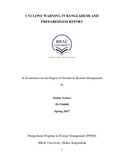Cyclone warning in Bangladesh and preparedness effort
Abstract
Historically the impact of cyclones on Bangladesh has been catastrophic, sometimes killing
hundreds of thousands of people. Usually the country faces the threat of cyclones on a yearly
basis but the strength and ferocity of these cyclones are being further escalated with the
increased threats of climate change with warming sea water and rising sea levels in the Bay of
Bengal. Climate change may increase the frequency and will cause more damage with the rising
sea level including inundation of newer areas affecting larger coastal communities for example,
Cyclone Roanu in May 2016 mainly impacted six coastal districts of Bangladesh but affected
more than 1.3 million people and displaced 200,000 even though the storm was considered to
be a low to medium strength.
Since the 1970s, the Bangladesh Red Crescent Society (BDRCS) and the Government of
Bangladesh (GoB) have been jointly managing a Cyclone Preparedness Program (CPP) based
on a wireless communication and network of over 50,000 volunteers. This programme has been
globally acknowledged for its efforts in reducing the number of deaths during the past major
cyclone events and is seen as the flagship program of BDRCS. Although early warning
messages issued by the BMD and CPP have saved several lives over the decades – which was
reflected in the Cyclone Mohasen and tropical Cyclone Mora where CPP and BDRCS
volunteers together managed to evacuate thousands of vulnerable people to safe shelter –
however, there is still a need of signalling system which can be more relevant for the residing
population at the coasts of Bangladesh.
The main problems identified on the existing early warning system are that the language it uses
to circulate the warning messages is official and is not comprehensible for most of the people.
Hence, people don’t pay attention on that since they don’t understand the technical information.
In many cases access to early warning message is also a problem as some time the wireless
communication is out of order. There were number of times when the warnings were false, so
people don’t have full trust on that as well. A study found that the forecasts produced by BMD
are not reliable for longer than 12 hours. Another analysis also says that the early warning
signals that Cyclone Preparedness Programme (CPP) use is mostly derived from the signals
used for maritime and river ports issued by the Bangladesh Meteorological Department (BMD).
However, in the past 50 years, Bangladesh has significantly reduced cyclone related deaths.
Therefore, it is evident that the CCP is effective to a certain extent but, still can be made to
reach a higher potential.

